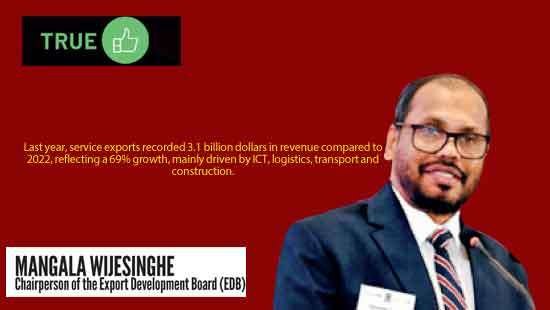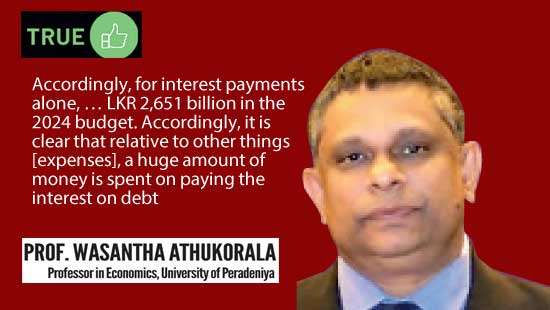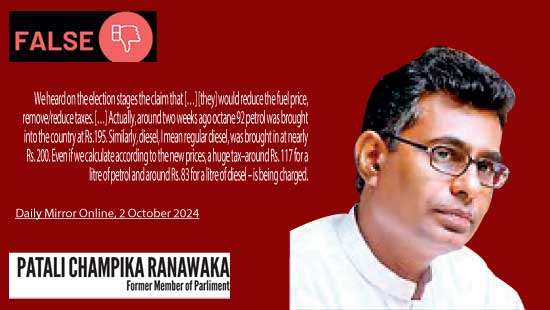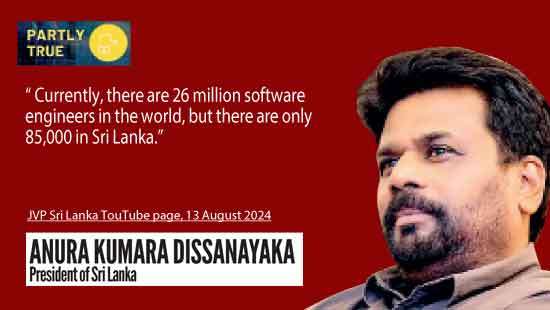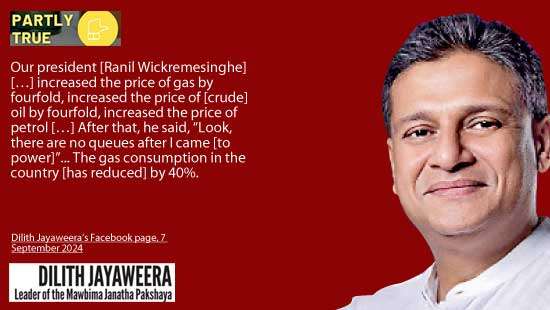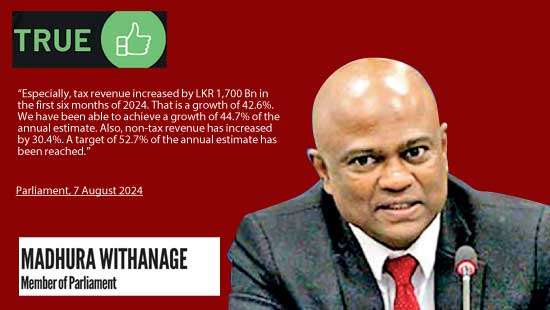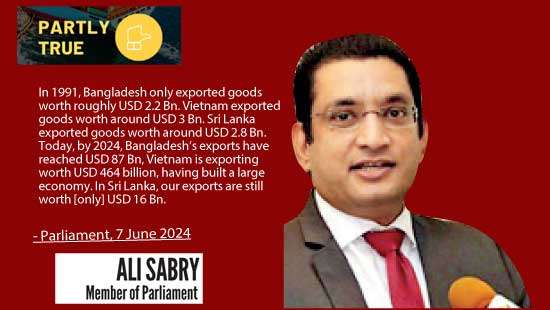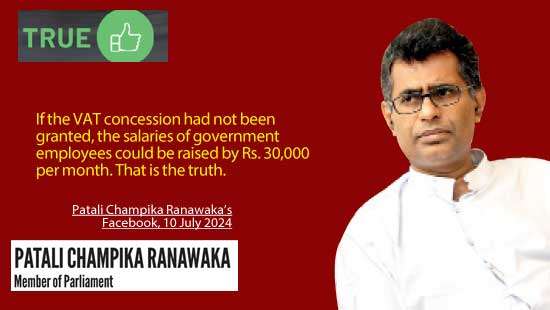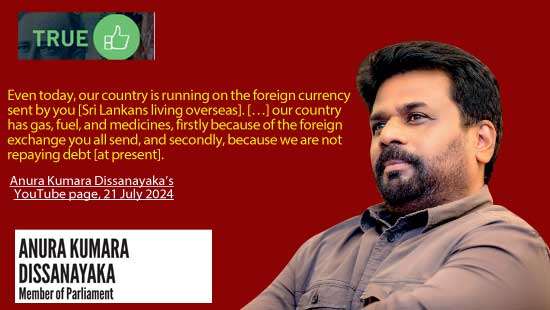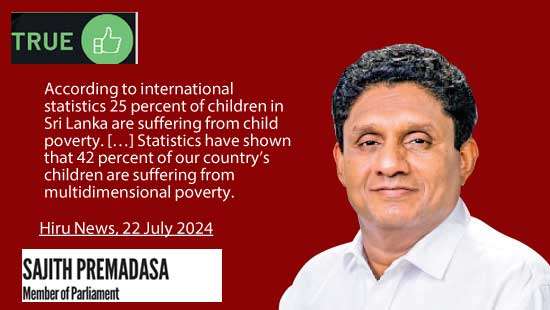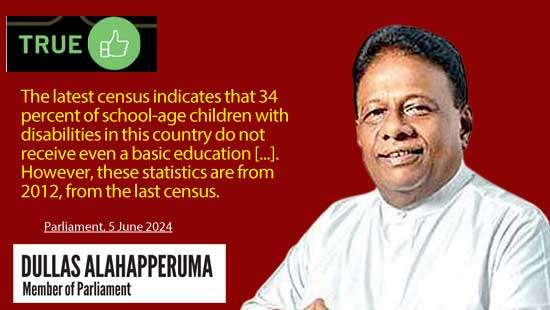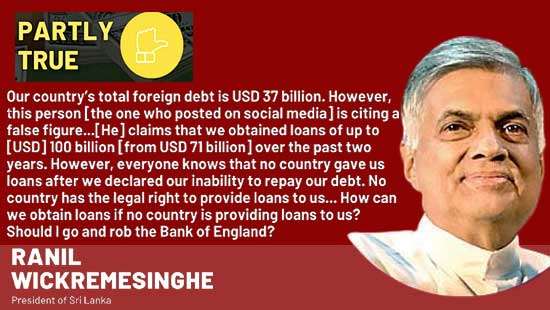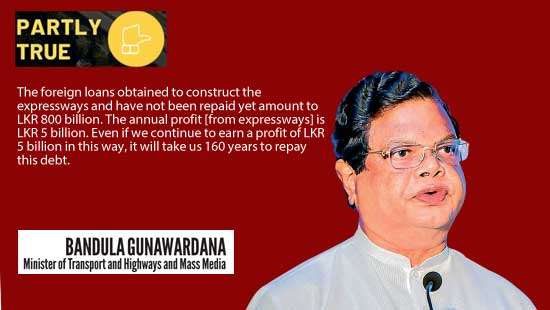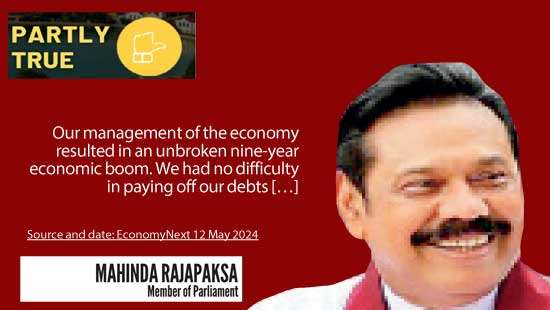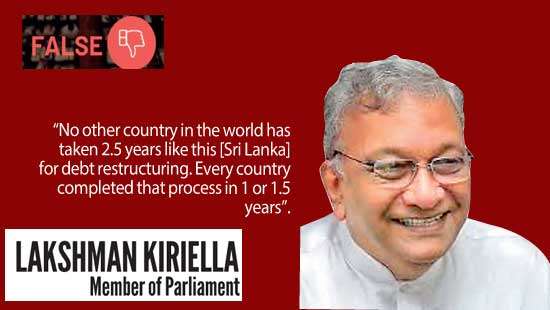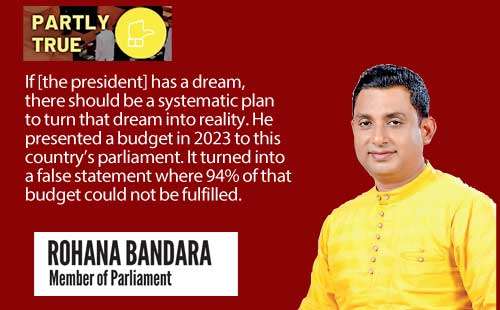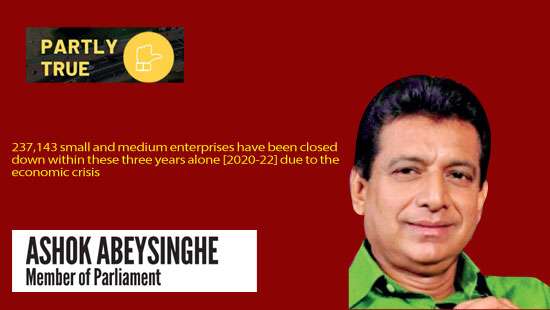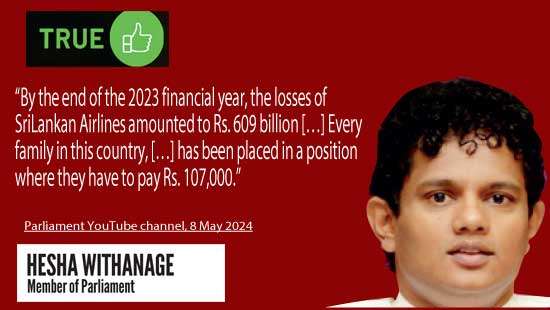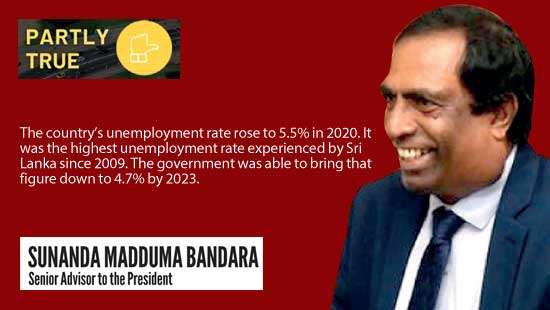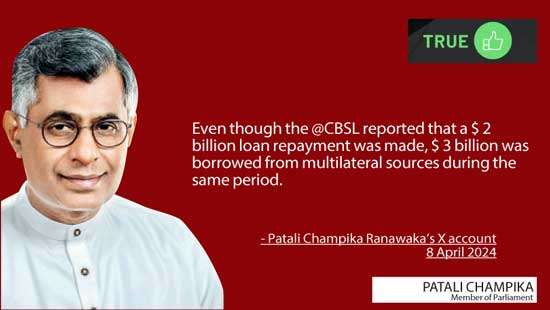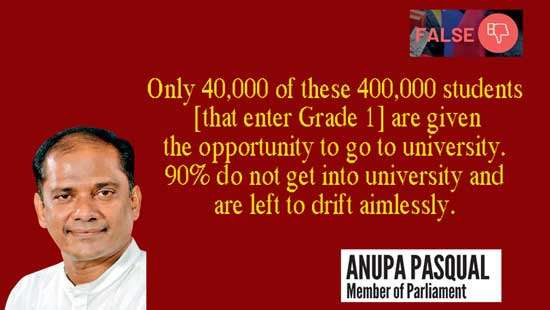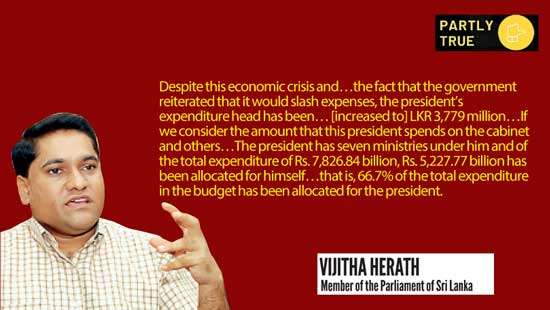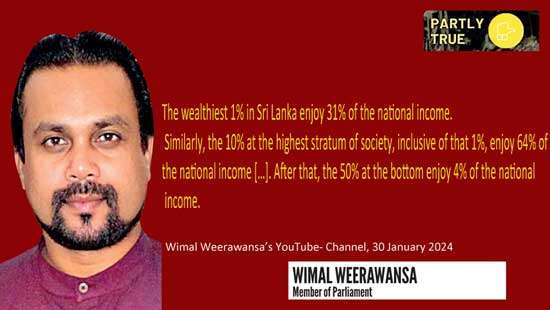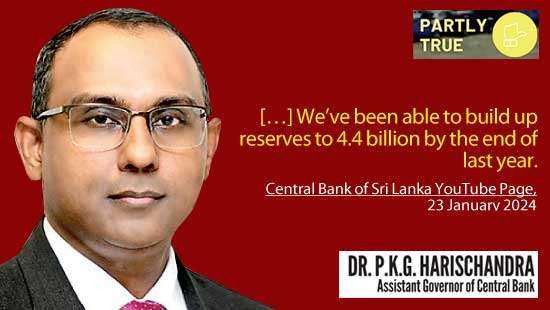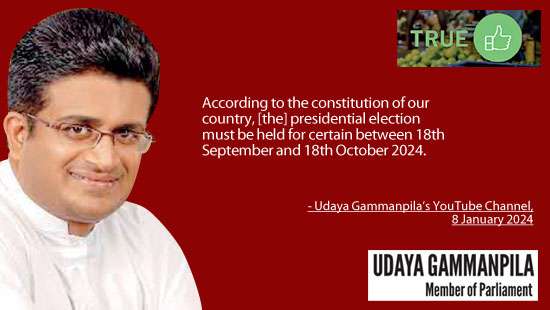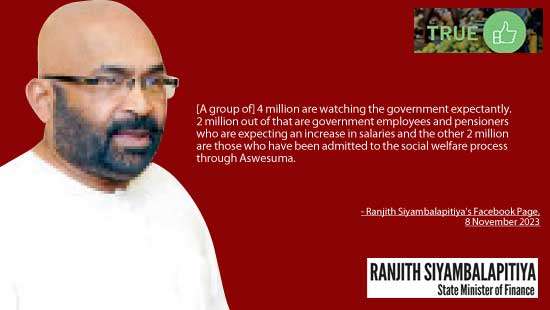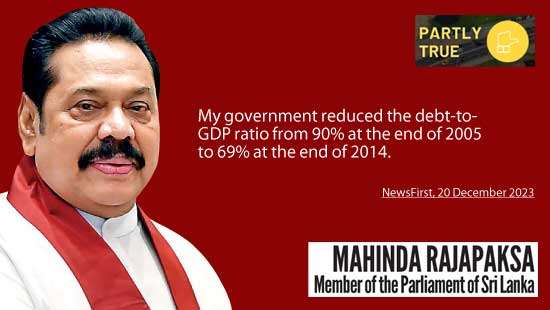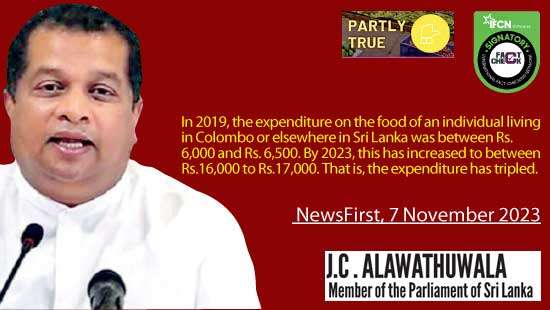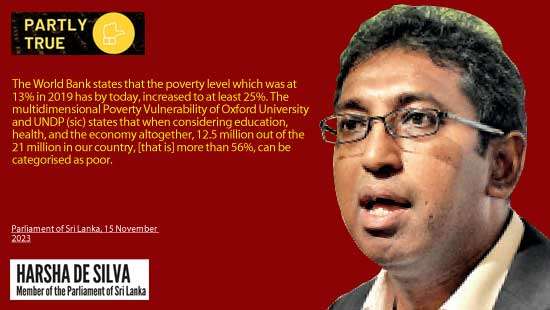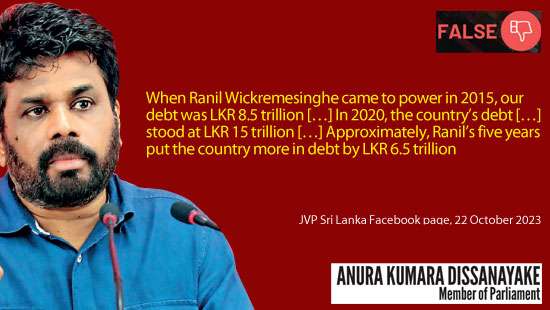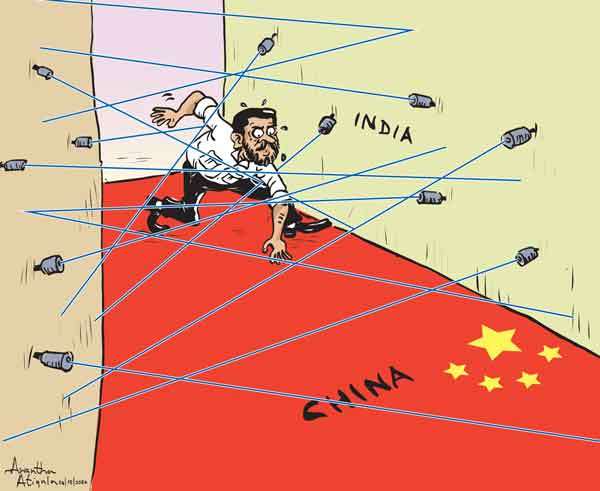Fact Check
Budget Burdens: Prof. Athukorala shows high ‘interest’
21 Nov 2024
 7
7
Professor in Economics at the University of Peradeniya Wasantha Athukorala highlighted Sri Lanka’s increasing domestic debt and rising interest payments—which have come in to focus in the current political discourse. He claimed that LKR 2,651 billion was allocated for interest payments in the 2024 budget and that this amount far exceeded spending on other expenditure categories.
Ranawaka uses incorrect calculation to make an incorrect claim on fuels
07 Nov 2024
 2
2
Former MP Patali Champika Ranawaka contends that despite promises made before the elections, to reduce the prices and taxes on fuels, it has not happened. He supports this claim by citing the difference between the import and market prices of the fuels, which he attributes to taxes.
Dilith J’s criticism of RW: more gas than substance
19 Oct 2024
 0
0
Dilith Jayaweera, leader of the Mawbima Janatha Pakshaya (MJP) claims: (1) that the former President Wickremesinghe increased the prices of oil and gas, fourfold; and (2) that the subsequent absence of gas queues during his presidency was a result of consumption declining by 40%.
MP Withanage’s boast: right on reduced revenue targets
26 Sep 2024
 0
0
MP Madhura Withanage claimed that in the first six months of 2024, (i) tax revenue had increased by LKR 1,700 billion, growing by 42.6%, and achieving 44.7% of the annual estimate, and (ii) non-tax revenue had increased by 30.4%, reaching 52.7% of the annual target.
Minister Sabry exposes anaemic export growth with imprecise numbers
12 Sep 2024
 4
4
Minister Ali Sabry argues that Bangladesh and Vietnam’s economies have outpaced Sri Lanka’s since 1991, driven by growth in exports. To support his argument, he cites export figures for all three countries from 1991, and 2023. The figures show that increase in exports in Bangladesh and Vietnam were orders of magnitude higher than that of Sri Lanka.
MP Ranawaka connects VAT concessions to lower govt. salaries
05 Sep 2024
 0
0
MP Champika Ranawaka cites a Ministry of Finance (MoF) document on tax expenditure, indicating that the loss of tax revenue due to the VAT concession could have been used to increase government employee salaries by Rs. 30,000 per month.
AKD: not short on how remittances are preventing shortages
23 Aug 2024
 12
12
At a public meeting in Japan, MP Dissanayaka claimed that the availability of foreign currency enabling the purchase of essentials such as gas, fuel, and medicines is due to (1) the inflow of worker remittances and (2) the suspension of debt repayments.
MP Premadasa’s child poverty figures add up
15 Aug 2024
 1
1
To emphasise the need for concentrated government efforts to address child poverty, MP Premadasa claimed that (i) 25% of children in this country suffer from (income-based) poverty, and (ii) 42% of children are experiencing multidimensional poverty.
MP Alahapperuma ably presents past data on children with disabilities
08 Aug 2024
 0
0
MP Alahapperuma argued that children with disabilities in Sri Lanka are underserved in their educational needs, claiming that 34% of children [with disabilities] do not receive any level of formal education based on the latest available data.
Fact-checking president’s fact-check on foreign loans
01 Aug 2024
 5
5
In response to an alleged social media post stating that the total foreign debt was USD 71 billion and increased to USD 100 billion during his presidency, President Wickremesinghe, stated in parliament that (1) the total foreign debt is only USD 37 billion, not USD 100 billion, and that (2) Sri Lanka has had no recourse to foreign borrowing as no country has the legal right to provide loans to Sri Lanka since it defaulted on its debt.
Minister Gunawardana lands on right conclusion with wrong logic and numbers
18 Jul 2024
 4
4
Minister Gunawardana justifies transferring expressways to a state-owned investment company to operate them as a “commercial enterprise” by arguing that: (a) Sri Lanka has borrowed LKR 800 billion in foreign loans to construct these expressways, and (b) it would take 160 years to repay the loans with the current annual profits (of LKR 5 billion). To check this claim, FactCheck.lk consulted the Road Development Authority (RDA) Annual Report of 20
Former president in some difficulty on no difficulty on debt repayment
11 Jul 2024
 3
3
MP Rajapaksa claims that during his tenure as president (2005-2014), there was an (1) unbroken nine-year economic boom, and (2) there was no difficulty in paying off debts. To verify these claims, FactCheck.lk consulted data from the Central Bank of Sri Lanka (CBSL) and Ministry of Finance annual reports, IMF world economic outlook 2024 and IMF staff report 2009. Claim (1): An ‘economic boom’ might be understood broadly as a consistent period
MP Kiriella lethargic on Sri Lanka’s lethargy in debt-restructuring
04 Jul 2024
 3
3
In parliament, MP Lakshman Kiriella claimed that (a) no country has taken as long as Sri Lanka (2.5 years) to complete the debt restructuring process, and (b) every country completed it within 1.5 years. To verify this claim, FactCheck.lk consulted the most comprehensive dataset on Debt Restructuring Episodes (associated with a paper by Christoph Trebesch) and the updates to it by Verité Research.
MP Rohana Bandara somewhat promising on Budget promises
27 Jun 2024
 0
0
In parliament, MP Rohana Bandara argued that the president’s futuristic claims were unrealistic and seemed to lack practical feasibility. Among his examples to further his argument, he stated that the government had failed to fulfill 94% of the budget presented ‘in 2023’. FactCheck.lk interprets his statement as referring to budget presented for 2023. The only public source evaluating budget implementation in Sri Lanka is the Budget Promises Das
MP Abeysinghe not firm on the closure of firms due to economic crisis
25 Jun 2024
 0
0
In a parliamentary speech, MP Ashok Abeysinghe claimed that 237,143 small and medium enterprises (SMEs) closed between 2020 and 2022 due to the economic crisis. This statement was made in the broader context of debates around micro, small, and medium enterprises (MSMEs).
MP Withanage lands on SriLankan Airlines debt per family
12 Jun 2024
 7
7
Addressing parliament, MP Hesha Withanage claimed that the losses accumulated by SriLankan Airlines (SLA) amounted to Rs. 609 billion, which in turn placed an average financial burden of Rs. 107,000 per family in the country. To check this claim, FactCheck.lk consulted the SriLankan Airlines Annual Report 2022/2023 (SLAAR) and the Household Income and Expenditure Survey
President’s advisor employs unemployment statistics incorrectly
31 May 2024
 1
1
President’s Advisor Sunanda Madduma Bandara stated that Sri Lanka’s unemployment rate reduced from a high of 5.5% in 2020 (highest since 2009) to 4.7% in 2023—and attributed it to government policy success. To verify the claim, FactCheck.lk consulted the 2023 Annual Economic Review of the Central Bank of Sri Lanka (CBSL). The stated figures align with the unemployment statistics: 5.5% in 2020 was the highest unemployment rate since 2009, and the
MP Ranawaka shows Sri Lanka borrowed more than it repaid in foreign loans
09 May 2024
 4
4
MP Ranawaka claimed on X (formerly Twitter) that Sri Lanka has borrowed more than it has repaid, citing USD 3 billion in new loans and USD 2 billion in repayments. FactCheck.lk understands his claim, as cited in his X thread, to refer to the period after the country’s April 2022 default on external debt (‘post-default’ period). To check this claim, FactCheck.lk reviewed the Central Bank of Sri Lanka (CBSL) statistical tables on its website, the C
MP Pasqual goes adrift on students “drifting aimlessly”
25 Apr 2024
 2
2
In his speech, MP Pasqual argues that only a small fraction (10%) of students have the opportunity to attend university and that everybody else, after completing school, is “left to drift aimlessly.” FactCheck.lk interprets the MP’s larger claim to refer to making a case for more state universities. This fact-check focuses on the statistics cited and the argument made by the MP to support his claim. There may be other arguments in support of his
MP Herath inflates president’s budget
04 Apr 2024
 0
0
In parliament, MP Vijitha Herath made two claims about expenditure allocations related to the president: (1) the budget line item titled president’s expenditure head (to discharge duties as the head of state) has increased to LKR 3,779 million, and (2) seven ministries headed by the president have been allocated 66.7% of the total budget expenditure. To verify the MP’s claim, FactCheck.lk referred to the draft Budget Estimates for 2024 (which wer
MP Weerawansa describes wealth inequality as income inequality
07 Mar 2024
 8
8
The MP argued at a press conference that Sri Lanka’s tax policies don’t take adequate account of the huge inequality existing among Sri Lankan citizens, when designing the distribution of the tax burden. In support of this larger argument, he provided the above statistics highlighting inequality. To check this claim, FactCheck.lk consulted the World Inequality Database (WID) and the 2019 Human Development Report (HDR) by the UNDP. The most recen
State minister Siyambalapitiya on 4 Mn people paid monthly by govt.
09 Feb 2024
 4
4
This claim by the State Minister Siyambalapitya was reported differently in the press. However, FactCheck.lk evaluated only his associated social media post. He can be understood as claiming that 4 million individuals will be receiving monthly payments from the government in 2024. He bases this figure on two groups: (i) 2 million who are government employees or pensioners,
MP Rajapaksa misrepresents past reduction of debt burden
01 Feb 2024
 15
15
In his statement, the MP claims that Sri Lanka’s debt-to-GDP ratio reduced from 90% at the end of 2005 to 69% by the end of 2014. To check this claim, FactCheck.lk referred to the Annual Reports of the Central Bank of Sri Lanka (CBSL) and the Ministry of Finance. The accounti
MP Alawathuwala sheds light on the plight of food expenses
18 Jan 2024
 0
0
MP Alawathuwala claims that the food expenses have tripled from 2019 to 2023, increasing from LKR6,000-6,500 to LKR 16,000-17,000. To verify the above claims, FactCheck.lk referred to multiple publications of the Department of Census and Statistics: (1) Price index data on the Colombo Consumer Price Index (CCPI) and National Consumer Price Index (NCPI), (2) Household Income and Expenditure Survey (HIES). The MP indicates that the range of values
MP de Silva poor on the interpretation of the poor
14 Dec 2023
 4
4
In his speech, the MP sets out a standard monetary poverty measure of the World Bank as 25% of the Sri Lankan population; and argues that when multidimensional factors such as education and health are considered, the poverty level is much greater. He cites multidimensional poverty as 56% of the population. To check this claim
AKD overblows RW’s yahapalanaya debt
07 Dec 2023
 8
8
MP Dissanayake claimed that debt had increased to unprecedented levels during Ranil Wickremesinghe’s tenure as prime minister (PM) from 2015 to 2019. In support of his argument, the MP cited that between 2015 and 2020, debt had increased by LKR 6.5 trillion to LKR 15 trillion (a 76.5% increase). To verify these claims, FactCheck.lk consulted the 2022 CBSL Annual Report. FactCheck.

Auction yields slump for third consecutive week
07 Dec 2023
 8
8

Moody’s raises Sri Lanka’s rating
07 Dec 2023
 8
8

ASPI crosses the 15,000 mark for the first time
07 Dec 2023
 8
8

Moody’s raises Sri Lanka’s rating
07 Dec 2023
 8
8

Probe underway as child dies after surgery at J’Pura hospital
07 Dec 2023
 8
8

Over 370 jumbos perish in 2024
07 Dec 2023
 8
8


